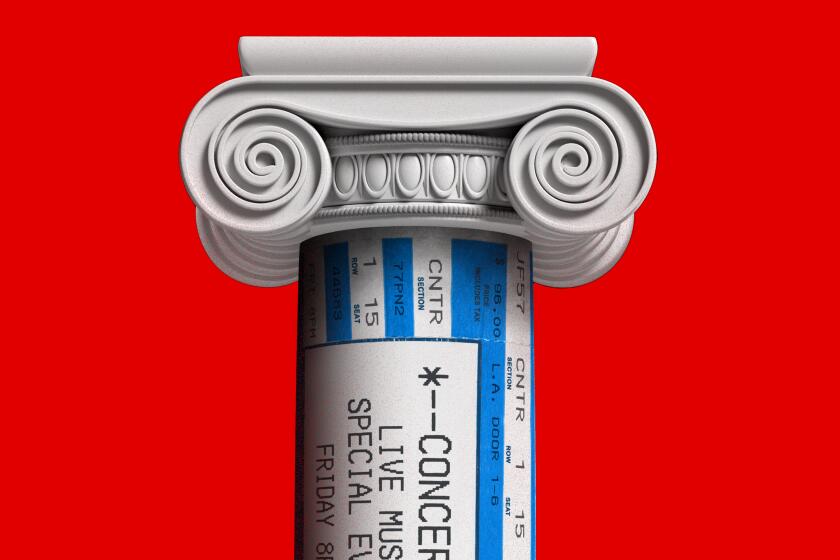Justice Department sues Live Nation, Ticketmaster over their ‘stranglehold’ on concert ticket industry

- Share via
The Department of Justice on Thursday announced that it had filed a lawsuit against Ticketmaster’s Beverly Hills-based parent, Live Nation Entertainment, seeking to break up the company over allegations that it created an illegal monopoly over the live entertainment industry.
The government, joined by 29 states and the District of Columbia, accuses Live Nation of using its power to dominate the industry by forcing venues into exclusive ticketing contracts and influencing artists to use only its services, threatening its competitors with financial retribution.
“Live Nation and its wholly owned subsidiary, Ticketmaster, have used that power and influence to insert themselves at the center and the edges of virtually every aspect of the live music ecosystem,” the suit alleges. “This has given Live Nation and Ticketmaster the opportunity to freeze innovation and bend the industry to their own benefit. While this may be a boon to Live Nation’s bottom line, there is a real cost to Americans.”
Live Nation currently controls more than 265 concert venues in North America and manages more than 400 musical artists, according to the Justice Department. The suit is seeking a jury trial.
California Atty. Gen. Rob Bonta, who joined the suit against Live Nation, said in an interview with the Times on Thursday that “there’s dominance and control by Live Nation in three aspects of the music industry — promotion, ticketing and venues. They tie those aspects of control together, and force venues to use their ticketing, artists to use their venues and retaliate when they can’t tie the three together. That leads to increased prices for fans and hurts artists as well as consumers.”
Live Nation released a statement Thursday in response to the suit. “The DOJ’s lawsuit won’t solve the issues fans care about relating to ticket prices, service fees and access to in-demand shows,” the company said. “Calling Ticketmaster a monopoly may be a PR win for the DOJ in the short term, but it will lose in court because it ignores the basic economics of live entertainment, such as the fact that the bulk of service fees go to venues, and that competition has steadily eroded Ticketmaster’s market share and profit margin.
“Our growth comes from helping artists tour globally, creating lasting memories for millions of fans, and supporting local economies across the country by sustaining quality jobs. We will defend against these baseless allegations, use this opportunity to shed light on the industry, and continue to push for reforms that truly protect consumers and artists.”

Live Nation and Ticketmaster have been scrutinized by the government for decades, going back to the 1990s when the rock band Pearl Jam criticized Ticketmaster in a hearing about its fees and market dominance. Complaints continued when the two firms merged in 2010, and exploded last year in a Senate hearing following the debacle around the sale of tickets for Taylor Swift’s Eras tour.
Sen. Amy Klobuchar (D-Minn.) led last year’s hearing on Live Nation and Ticketmaster.
“Consolidation and unlawful conduct in the ticketing market has left buyers with fewer choices and higher prices. The hidden fees, the messed-up processes, and the stranglehold on competition has long hurt fans,” she said in a statement to The Times. “As a result, the live event entertainment experience has become increasingly out of reach for many Americans. The Justice Department is doing the right thing today by seeking to break up this monopoly that has long harmed fans, artists and venues. In addition to holding Live Nation accountable, I’ve also fought to create common sense guardrails to promote healthy competition in the ticketing market, and I will continue to work toward passing my bipartisan legislation that would do just that.”
Mark Lemley is the director of the Stanford Program in Law, Science and Technology, where he studies antitrust law. He said that the concerns laid out in the suit have trailed the company for years.
“These were the two largest providers in the industry who locked up exclusive deals with the most valuable venues,” Lemley said. “They’ve basically got a monopoly for many places bands want to play, and there just aren’t many other choices. The reason we don’t like monopolies is not just because we want people to have choices, but because companies can raise prices and have services degrade, and we’ve seen exactly that with Live Nation and Ticketmaster.”
“A number of bands and venues and fans would rather go elsewhere,” Lemley continued. “The idea is, let’s give them a chance to.”
The Justice Department is seeking structural remedies to break up the company because Live Nation already operates under a 2010 federal consent decree that allowed Live Nation to merge with Ticketmaster.
The Justice Department said in a 2019 statement that the agreement “permitted Live Nation to merge with Ticketmaster but prohibited the company from retaliating against concert venues for using another ticketing company, threatening concert venues or undertaking other specified actions against concert venues for 10 years.” The company agreed to extended oversight through an independent monitor through 2025, and agreed it would not retaliate against competition.
The Justice Department updated and extended that agreement in 2019 because, in its view, “despite the prohibitions in the Final Judgment, Live Nation repeatedly and over the course of several years engaged in conduct that, in the Department’s view, violated the Final Judgment.”
“The original set of conditions in 2010 provided a great pathway forward,” Bonta said. “The merger was conditional. They had to follow those conditions and if they didn’t agree, there would be no approval. They agreed, then they violated it. That required regulators and enforcers to take steps.”
Rebecca Allensworth, a legal scholar and antitrust violations expert at Vanderbilt University, said that while “antitrust courts have for years preferred behavioral remedies to breakups, this is a rare case where a breakup is not impossible. That’s because a new consent decree is going to look unattractive, given that Live Nation is allegedly not complying with the one they have.”
Live Nation’s business model is predicated on what it calls a “flywheel,” where its vast reach across the concert industry gives it leverage to grow its most profitable businesses. The company has exclusive ticketing contracts that cover around 70% of sales at major venues.
In a 2023 earnings report, President and Chief Executive Michael Rapino said that “as we then look to 2024 and beyond, we have all the necessary levers to build our flywheel globally and continue to compound [adjusted operating income] by double digits for the foreseeable future.”
“Live Nation controls wide swaths of live music in the United States because of its multidimensional power,” the Justice Department’s suit alleges, citing powerful stakes in “live events promotions, primary ticketing, secondary ticketing, venue ownership and operations, music festivals, artist management, sponsorships, and more.”
“Live Nation uses its concert promotion business — the core of its ‘flywheel’ — to feed its other high-margin businesses, including Ticketmaster’s ticketing business, Live Nation’s network of venues, as well as Live Nation’s sponsorship and advertising business.”
The suit alleges one typical 2021 incident where “Live Nation threatened retaliation against a venue that had decided to switch from Ticketmaster to SeatGeek for primary ticketing. That venue had decided to switch, in part, because SeatGeek offered to share a greater percentage of the fees associated with secondary ticketing. Upon learning about the potential switch, a senior Live Nation executive texted a not-so-subtle warning to the venue’s CEO: “Apparently seatgeek are telling [nearby venue] and others that they have a contract deal with you guys already?? Anyways should think about bigger relationship with LN not just who is writing a bigger sponsorship check.”

A few days later, Live Nation’s CEO emailed the venue’s owner that Live Nation “will be very concerned that SeatGeek, a secondary provider, will be selling our LN artist tickets when not authorized by the artist,” the suit continues. “Once the venue switched to SeatGeek, Live Nation followed through on its threats, rerouting concerts to other venues.”
“Tying agreements are the core of the anticompetitive conduct,” Bonta said. “They’re leveraging their monopoly. They threaten to not let you use any of it if you don’t use all of it.”
The suit also aims at Live Nation’s long-standing practice of using its significant resources to acquire potential competitors. Referencing its 2016 purchase of a controlling stake in AC Entertainment, Bonnaroo’s parent firm, the suit alleges that “Live Nation’s Chief Strategy Officer explained to Live Nation executives: ‘The numbers are not super exciting and this feels like more of a defensive move to keep [rival] AEG out of the region.’”
“It’s not illegal to have no competition, but what are illegal are the tactics that a vertically-integrated company uses to maintain it,” Allensworth said. “Things like using your power over concert promotion to force people to buy tickets through Ticketmaster, or threatening a competitor with retaliation in other markets including concert promotion if you don’t.”
Some experts are skeptical that the Justice Department’s proposed remedies would meaningfully lower ticket prices and improve fan experiences.
Bob Lefsetz, a longtime concert-industry watcher, said in his most recent newsletter that breaking up the company is “not going to make ticket prices any lower. Assuming that Live Nation and Ticketmaster are broken up, or ticketing is not exclusive at venues. Ticket prices have nothing to do with Ticketmaster. If anything, a remedy will help other promoters, who will be able to participate in ticket resale by using another platform. But if you think any change is going to trickle down to the consumer, you’re delusional.”
Dan Wall, Live Nation’s executive vice president for corporate and regulatory affairs, said in a statement that the suit “ignores everything that is actually responsible for higher ticket prices, from rising production costs, to artist popularity, to 24/7 online ticket scalping that reveals the public’s willingness to pay far more than primary ticket prices. It blames Live Nation and Ticketmaster for high service charges—and just the fact that there are fees—but ignores that Ticketmaster retains only a modest portion of those fees.
“At bottom, we are another casualty of this Administration’s decision to turn over antitrust enforcement to a populist urge that simply rejects how antitrust law works,” Wall continued. “Live Nation can offer and has offered fans, artists, venues and the rest of the live entertainment ecosystem better prices and better services than they would receive if these complementary businesses were separated.”
Lemley said that breaking up the company could encourage artists and venues to “get rid of long-term exclusivity deals, and allow other companies to get traction in the market. You could put some restrictions on the nature of fees. We might see high profile bands break away if they had a real choice.”
The Justice Department’s suit comes amidst a flurry of recent high-profile antitrust action. The Justice Department sued Apple in March, and the Federal Trade Commission sued Amazon last year.
If successful, the suit would profoundly reshape the concert industry, from Live Nation’s global ambitions down to fans just trying to get Eras tour tickets.
“You see things like the Taylor Swift overload, where Ticketmaster’s technology and capacity and performance as a business was not good, but it doesn’t have to be good because they have no competition,” Bonta said. “Consumers and fans deserve better.”
More to Read
The biggest entertainment stories
Get our big stories about Hollywood, film, television, music, arts, culture and more right in your inbox as soon as they publish.
You may occasionally receive promotional content from the Los Angeles Times.












